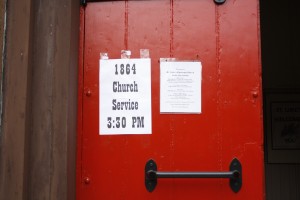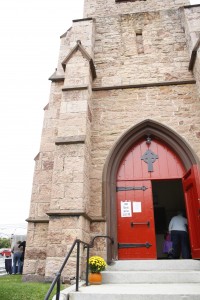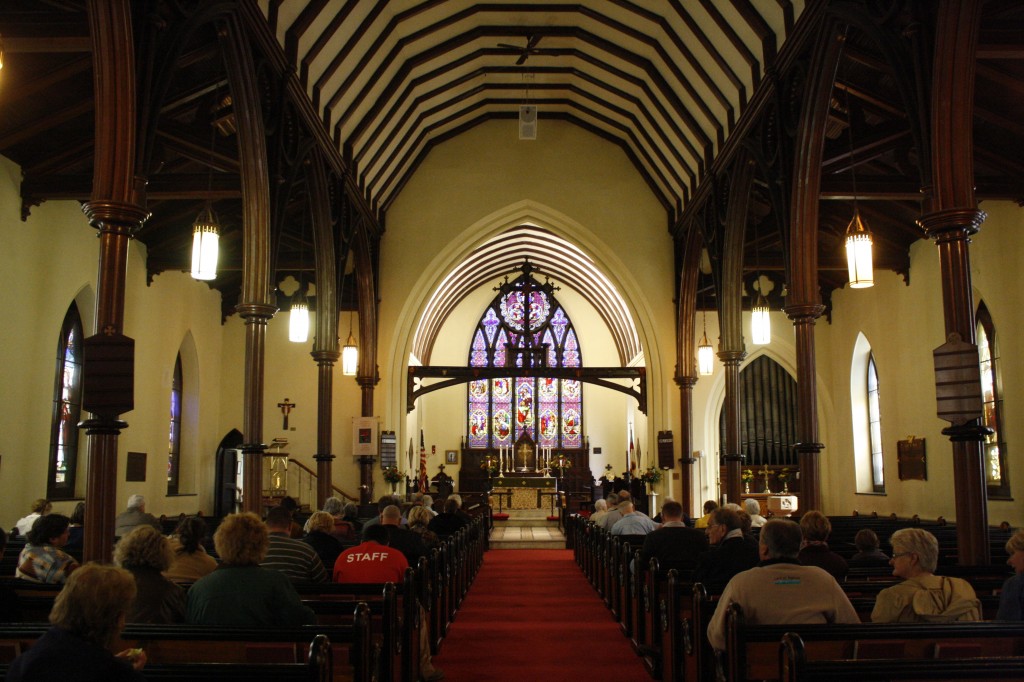ST. ALBANS — Though it may have been a smaller and quieter part of the weekend’s St. Albans Raid 150th Anniversary Commemoration re-enactments, Mayor’s Ball, and other events, the 1864 church service conducted at St. Luke’s Episcopal Church over the weekend would have been central to the community in a century and a half ago.
 More than 50 people attended the evensong service, taken out of the 1845 edition of the 1789 Book of Common Prayer of the Protestant Episcopal Church, on Saturday. According to Rev. David Veale, who led the service in period robes, St. Luke’s pews would have been packed full during the Civil War years.
More than 50 people attended the evensong service, taken out of the 1845 edition of the 1789 Book of Common Prayer of the Protestant Episcopal Church, on Saturday. According to Rev. David Veale, who led the service in period robes, St. Luke’s pews would have been packed full during the Civil War years.
“At that time, just about everyone went to church,” Veale said. “It was part of the culture.”
During wartime, people went to church for community, for support, and for comfort. “Certainly with so many people engaging in the fighting, especially in Vermont,” said Veale. He pointed out that Vermont, as a state, lost more men to the civil war per capita than any other state in the country.
“The church turned out to be a very big support system for the families of Army folks,” Veale said. In addition to providing meals, farm help, or anything else people may have needed, Veale said that the church also looked to provide purpose to the women who were widowed or left as young maidens.
“The Episcopal Church actually revived orders of the nuns and deacons to give women a role within the church,” said Veale.
In addition to supporting those who fell victim to the horrors of war, Veale said the Episcopal Church also became embroiled in the abolition versus slavery politics of the time, dividing unofficially in the 1860’s between northern, Union-supporting churches and southern, Confederate-supporting churches.
The church’s leader at the time, Bishop John Henry Hopkins, showed sympathy to confederate notions, said Veale, in order to try and keep the church together, though unsuccessfully.
“It did split the denomination for a time,” said Veale. “The Episcopal denomination in the south never recovered.”
The service
 Conducted in the only church still standing that was originally in St. Albans during the Civil War and interspersed with hymns played on an organ that is more than 150 years old, St. Luke’s 1864 evensong service was heavy with themes of war and battle, unity, forgiveness and prayers for peace.
Conducted in the only church still standing that was originally in St. Albans during the Civil War and interspersed with hymns played on an organ that is more than 150 years old, St. Luke’s 1864 evensong service was heavy with themes of war and battle, unity, forgiveness and prayers for peace.
The service was half-an-hour long and consisted of several hymns, lessons and prayers. The hymns, with phrases like “Stand up, stand up, for Jesus, ye soldiers of the cross” and “He has sounded forth the trumpet that shall never call retreat; He is sifting out the hearts of men before his judgment seat,” are from a hymnal that was written in part by a Vermont priest, John Henry Hopkins Jr. Several of Hopkins’ hymns were played in St. Luke’s for the first time.
“Music was always a big part [of church],” said Veale.
In the service’s prayers, specific people were named to give supplications for, including President Abraham Lincoln and Elinus Morrison, who was murdered during the Oct. 19, 1864 raid in St. Albans.
“Finally, we commend to thy fatherly goodness all those who are in any ways afflicted, or distressed, in mind, body or estate, especially Elinus Morrison who was mortally wounded this day; that it may please thee to comfort and relieve them,” Veale read near the end of the service.
The last hymn, ending with a refrain of “Glory! glory! Hallelujah! His Truth is marching on,” ended the Saturday Civil War service. And probably much like it was in 1864, churchgoers chatted, greeted each other, and left to go out into the community.
—
By Elodie Reed, St. Albans Messenger




